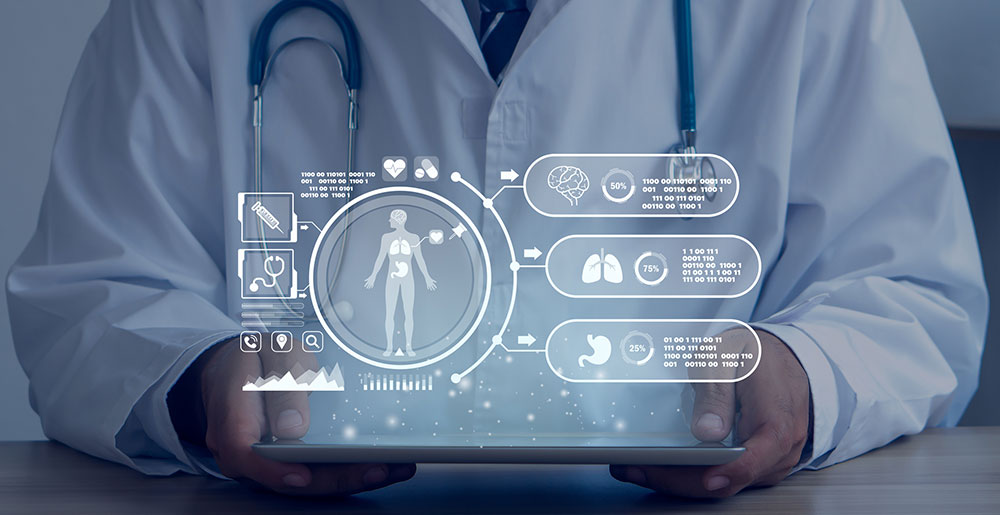Artificial Intelligence is Helping Deliver Cancer Outcomes Better than the National Average

Artificial intelligence (AI) is a transformative technology. It is changing the way people work, play and learn, triggering far-reaching results we can’t yet comprehend. But nowhere are we exploring AI, and its subcategory machine learning (ML), with more important consequences than the field of oncology.
AI is a catch-all term that refers to the mimicking of human intelligence by machines; a subset of AI, ML refers to the use of computer algorithms to simulate human learning without being explicitly programmed, from ongoing experience-based improvement in performance.
In the rapidly evolving world of AI, ML algorithms have grown tremendously as powerful data analytics technologies. The recent advances in generative AI specifically with technologies such as chatGPT becoming available to the public, a new era AI/ML has emerged. For oncology researchers and physicians, this has unlocked possibilities to analyze and benefit from massive amounts medical data (text, images, molecular information, etc.) in a way that was previously impossible or prohibitively time-consuming.
Groundbreaking research, personalized care and proven outcomes meet machine learning to create the cancer center of tomorrow
Florida’s only-based National Cancer Institute-designated Comprehensive Care Center, Moffitt is a national leader in delivering expert cancer care—resulting in survival rates up to four times the national average. It’s also home to one of the first cancer center-based Machine Learning department devoted specifically to diagnosing, treating, and preventing cancer.
The Machine Learning Department at Moffitt Cancer Center focuses on accelerating scientific discovery in cancer research through the design, development, and clinical translation of patient-centered state-of-the-art AI/ML algorithms.
These algorithms apply human-level cognition augmented with advanced computational power to help researchers identify novel insights from large volumes of high-dimensional data. This includes genetic information, biomedical images, text in electronic medical records, and information captured from mobile health devices.
New patterns identified within this data may be used to diagnose cancer earlier, identify novel drug targets for the treatment of cancer, predict which patients will respond to certain therapies and optimize how patients are cared for at a personalized level.
Explore AI in action at Moffitt Cancer Center
In partnership with the research and clinical teams at Moffitt Cancer Center, Machine Learning faculty are currently applying ML—and conducting research to further leverage ML—across key areas in the detection and treatment of cancer:
Speeding up biomarker-based treatment decisions in NSCLC
For patients with advanced non-small cell lung cancer (NSCLC), biomarker tests play an important role in determining the course of treatment.
Currently, biomarker tests require archived tissue or samples taken from a biopsy. However, a biopsy is an invasive procedure, and testing may fail if the sample is lacking in either quality or quantity. Additionally, results may take weeks—time that many patients with NSCLC don’t have. As a result, researchers have long been working to find an alternative method for performing biomarker testing that sidesteps the biopsy.
In late 2022, such a method was presented. At the Society for Immunotherapy for Cancer Annual Meeting, Moffitt researchers unveiled data demonstrating that AI can use images to perform biomarker tests.

Specifically, a retrospective study of 837 NSCLC patients found that AI performed just as well as a traditional lab biomarker test in identifying EGFR mutations and PDL1 expression—the former has a higher response rate to targeted therapy while the latter can be treated with immunotherapy.
There are many benefits to using AI image analysis over biopsy: It doesn’t require lab testing, the images reflect the entire tumor versus only the portion biopsied, and biomarkers can be calculated immediately after a scan. According to Matthew Schabath, PhD, research program lead for Moffitt’s Cancer Epidemiology program, in cases where time is of the essence, “This has tremendous potential in speeding up the delivery of therapy.”
Researchers will now work to validate the program on larger data sets and eventually open a trial to test AI in a real-world clinical setting. And on the heels of this success, Moffitt has been funded to expand research to other pressing questions, such as whether assessing biomarkers using AI-analyzed images can be used to predict response to KRAS inhibitors and the newest generations of TK inhibitors.
Additionally, they plan on building the largest study of its kind to determine the incidence of hyperprogression, a lethal phenotype found in a subset of patients treated with immunotherapy. According to Schabath, “Researchers will be imaging biomarkers to predict who may experience hyperprogression and to determine if hyperprogression is found in therapies other than immunotherapy.”
Improving breast cancer detection
For women with breast cancer, screening plays a huge role in survival rate. For example, the incidence of breast cancer has been increasing by 0.5% per year, yet death rates are decreasing—as a result of improved screening technologies and mammogram guidelines.
In a Sweden-based trial, researchers looked at images from more than 80,000 women who underwent a mammogram between April 2021 and July 2022. Half the women had their mammograms read by AI and then analyzed by an experienced radiologist. The other half had their mammograms analyzed by two experienced radiologists without the use of AI.

In the women whose scans were read by the combination of AI and radiologist, 20% more cancers were detected, without an increase in false positives. The radiologists in this group also cut their reading workload by nearly half.
At Moffitt, radiologists are already using AI to supplement human interpretation. According to Bethany Niell, MD, PhD, section chief of breast imaging at Moffitt, this is just the beginning.
Niell believes AI algorithms have the potential to help patients with breast cancer in a range of ways. Specifically, she says, “AI may be able to improve breast cancer detection, decrease unnecessary imaging and radiation exposure, more accurately predict the risk of developing breast cancer during a patient’s lifetime, and prioritize care for patients who have suspicious findings identified on their imaging examinations.”
Aiding in treatment development and delivery
Discovering more targeted, effective cancer medications is always on researchers’ minds. At Moffitt, ML faculty are currently developing algorithms to be used in drug discovery.
“All of these examples are looking at one or two data types at a time, whether it’s molecular data, radiologic imaging or radiation treatment parameters," Dana Rollison, PhD, vice president, chief data officer and associate center director of Data Science at Moffitt summarizes. “But our vision is to be able to combine all of these data types, along with digital pathology, social determinants of health and patient-reported outcomes, all of which can impact a patient’s response to treatment. Moffitt’s ongoing investment in the curation of data from the electronic health record and development of machine learning algorithms is a cornerstone for the advancement precision oncology and improved cancer patient outcomes in the future.”
Learn more about how Moffitt Cancer Center is leveraging AI to better detect, treat and prevent cancer. If you'd like to refer a patient to Moffitt Cancer Center, complete an online form or contact a physician liaison for assistance.
